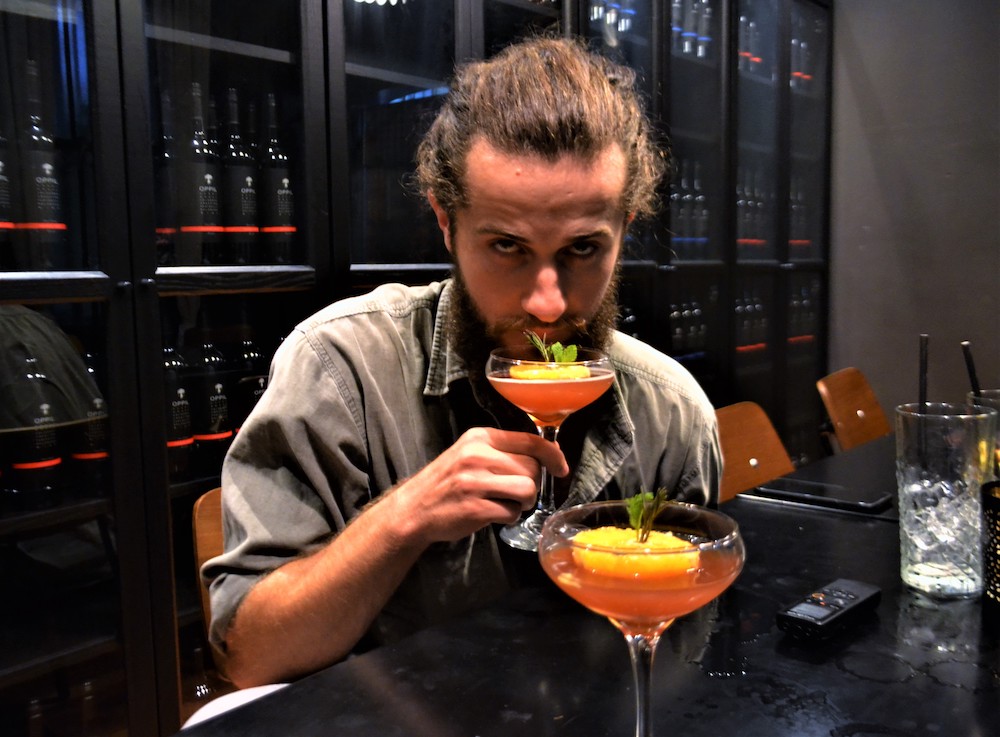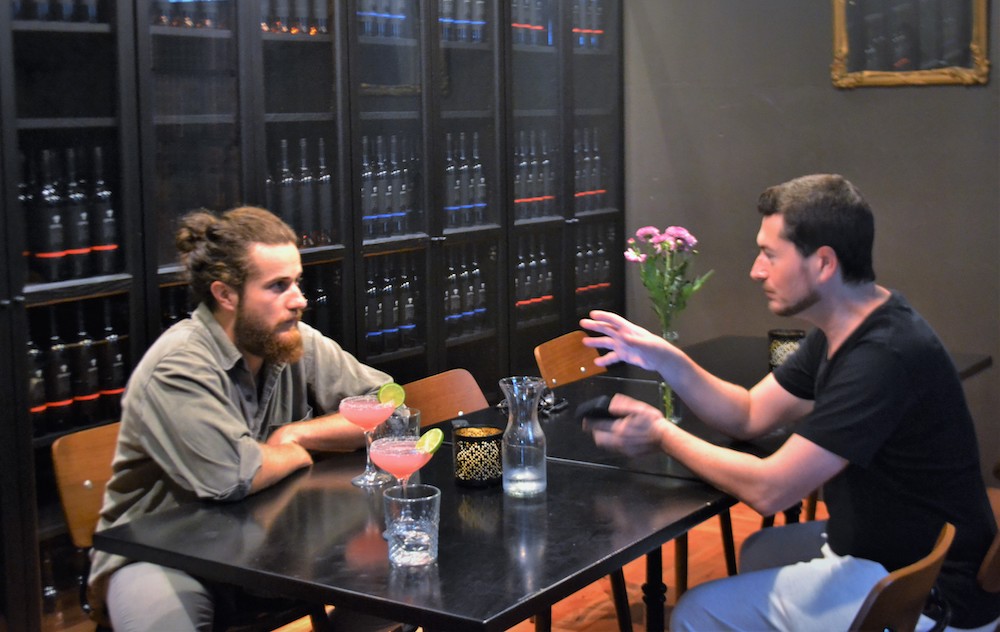OPPIL is a cocktail bar situated at the north end of King Street, the main artery of Sydney’s Inner West. What makes the bar special is not what it claims to do, but what it claims not to do. OPPIL claims their cocktails won’t give you a hangover, which sounds too good to be true. What goes up must come down and what goes down must come up into the toilet the next morning: surely these are the laws of the universe.
I had to know more.
Videos by VICE
To my great excitement, OPPIL offered me two nights of solid drinking to test the veracity of their claims. I’d spend one night drinking regular booze, and another night drinking the potential booze of the future. I wouldn’t know which night was which, but hopefully the effects would be made clear the next morning.
Colin Dahl is the founder of OPPIL. He comes from an engineering background, and was cautious about the integrity of our randomised test, so he provided me with a sealed envelope that contained the results. I then signed the envelope and tucked it away.

I started the first night with a choice of three spirits: vodka, gin, or tequila. To make it a real test, I picked tequila: the international drink of regret. Dahl then gave me a quick health questionnaire before starting: when I last ate, what I ate, how much I’d slept, and how much water I’d drank throughout the day. Caffeine? MSG?
I answered the questions and then Dahl told me to start drinking. Over the course of an hour and a half, I put back five cocktails made from a total of 225 ml of tequila. A third of a bottle of tequila is probably not what you would consider a wild night out but still, it’s enough to leave a mark the following day. Luckily for Dahl and the quality of his experiment, I was coming off the back of dry January and hadn’t had a drink in 31 days.
While five drinks might not sound like a huge amount, after a month of sobriety I felt pretty drunk and left the bar to get a kebab, then went to bed.
I awoke at 5 AM with a piercing headache and a parched throat. I drank some water and flopped back into bed but it was no use. I was awake, horribly hungover, and hoping that I’d spent the night drinking plain old tequila. Otherwise I’d have to tell Dahl that his science-alcohol didn’t work.

Dahl stumbled across the idea for hangover-free wine while working on a treatment for rosacea, which is that red flush people sometimes get on their faces when drinking, which is caused by an inherited deficiency in one of the enzymes responsible for the breakdown of alcohol: aldehyde dehydrogenase.
Dahl discovered that by increasing levels of antioxidants in alcoholic beverages with concentrated grape extract, he was able to assist the body’s metabolisation of alcohol. Trying the new booze on himself, he noticed something else: he didn’t have a hangover. Excited, he spent the next three years refining the process into a commercial product.
“We’ve just infused it with red grapes,” he explains. “We suspect that antioxidants are getting transferred, because that’s the only thing we can think of that might be balancing the toxicity of ethanol byproducts.”
He believes that antioxidants from grapes neutralise the free radicals secreted by your liver as alcohol gets broken down, resulting in a nullified hangover.

It sounds ludicrously simple: just add antioxidants to alcohol and boom, no hangover. So I asked him why no one else has ever done it, and what happens when the secret is out and breweries with deep pockets start stealing his creation.
Dahl replied that he’s fine with that as there’s currently not a lot of innovation in drinking. “I often laugh when I hear established spirit brands advertise that they have used the same formula for over 250 years—couldn’t they think of a better way in 250 years!”
As for the copycats, “I’d be disappointed if it didn’t happen,” he said. “We want to change the world but we don’t have to take the whole market. I’ve been drinking this now for a long time and I don’t want to drink anything else.”
So if someone like Carlton United comes out next week with a hangover-free beer, you’d be happy with that?
“If that’s because of our work, yeah. If other companies or brands start to develop these kinds of products, that’s great.”

My next test was Wednesday, giving me a day of recovery between sessions. I walked in and was greeted and seated before running through the exact same process as before. Questionnaire then five cocktails. Margarita, tequila and dry, tequila soda, old fashioned, margarita.
The drinks seemed slightly… thicker? They had a tannin consistency that they didn’t have before, but I slammed them down in almost the exact same time frame and then bustled out to get my kebab on the way home.
The next morning, the results were in. Incredibly, I felt fine. I woke up slowly and for a minute didn’t remember that I’d drank five cocktails the night before. I felt completely normal. No headache, no nausea, no stinging eyes. I was tired but that was nothing new. I felt like I’d been tricked. What was going on here?
I called Dahl and asked him what he’d done. I felt somehow weird about it, as though a hangover is nature’s way of communicating that you did something dumb the previous night—but my body had stopped talking. I asked Dahl if he’d just reinvented the wheel.
“If companies think that selling their current high hangover-producing products to consumers can continue as business as usual, they might be in for a shock” he said. “I think the time is right and people are ready to drink better.”
Dahl has begun his global conquest in a bar so that he can contain the narrative and explain the benefits of the drink. On the shelf at a bottle shop, he says the product gets lost. In a bar he can explain how it works and why. He is currently working on takeaway products with wine, spirits, and even beer.
I was highly sceptical before, but I have to admit that I was sold. Most people like booze, but no one likes hangovers. If you could drink this alcohol with no repercussions, why would anyone drink anything else?
I could suddenly imagine a future without hangovers and imagine that someday OPPIL might become the Bethlehem stable of future mixology. It’s unclear whether the world is really ready for this future of no consequences, but now the genie is out of the bottle we can only sit back and watch.
Follow Jack on Twitter




